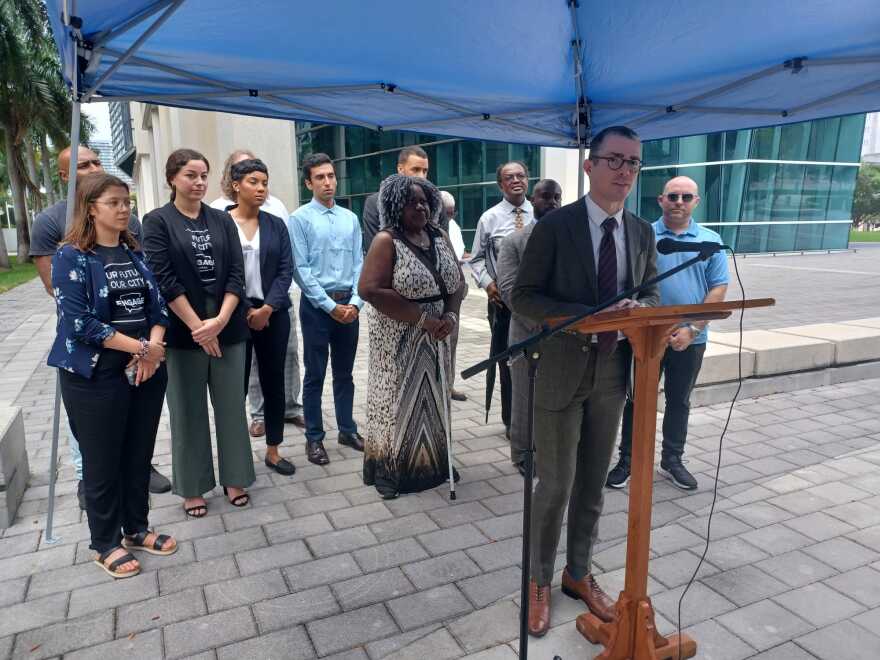Updated at 9:15 a.m. on June 6.
A federal judge has denied the City of Miami's attempt to hold onto its district map, which has been accused of being "racially gerrymandered," and now community groups are looking for resident input on their vision for Miami's next map.
Last month, Judge K. Michael Moore ordered Miami's administration to toss out its map of the city's five commission districts after plaintiffs represented by the ACLU of Florida argued that the city drew the map predominantly on the basis of race.
The judge agreed with a report that the plaintiffs were likely to succeed in their allegation, based largely on comments from commissioners during public meetings.
Commissioners Alex Diaz de la Portilla and Joe Carollo spoke at length about preserving three Hispanic districts, one Black district and one white district during commission meetings with map consultant Miguel De Grandy.
READ MORE: Judge recommends City of Miami toss out its district map over 'racial gerrymandering'
The City appealed Judge Moore's decision on May 31 and requested he hold off on enforcing his order pending the appeal. Following a status conference with the judge on Friday, ACLU of Florida attorney Nicholas Warren said the judge had "indicated he would deny that motion", but there have been no updates to the case docket to confirm that.
The plaintiffs, which include advocacy groups Engage Miami and the Grove Rights and Community Equity (GRACE), came up with their own ideas for "logical" district shapes late last month. Their two proposed maps attempt to use natural boundaries such as the Miami River and major roadways as borders for the districts.
The groups held a community forum Monday night at 6:30 p.m. to show these maps to the community at Greater St. Paul A.M.E. Church, in Coconut Grove.

Consulting the community over new maps
More than 60 attendees came to the forum, including representatives from the office of Commissioner Sabina Covo, who represents Coconut Grove in District 2; as well as several of Covo's former opponents for her District 2 seat such as James Torres and Javier Gonzalez.
One resident asked how locals can make a real difference in City Hall outside of a lawsuit like the one brought by plaintiffs. ACLU of Florida attorney Warren said to continue showing up to city meetings and making resident voices heard.
"Everyone's objections [at city commission meetings] last year were in the record that the court reviewed, and it made a difference. It may not make a difference in the way that you intend with the votes of the commissioners changing at the time, but it really does make a difference," Warren responded.
The engaged attendees were also keen to dig into the details of the proposal and the case. They asked how the groups came up with their proposed maps and how the maps sought to protect Black voters throughout the city.
Warren explained that the maps were drawn along natural boundaries such as rivers and major roads, and made in an attempt to keep existing neighborhoods together in one district. Under the existing city map, several communities are carved across districts, including Coconut Grove, which is split between Districts 2, 3 and 4.
He also noted that the maps were drawn by an expert who performed analysis as to the number of Black registered voters in each district, rather than the number of Black residents at voting age, which is the figure the city used in its analysis.
According to Warren, the plaintiffs' proposed maps have a Black voter registration share of between 52% and 53% for Miami's District 5, so Black voters in that district have an opportunity to elect a candidate of their choice.
"What the Voting Rights Act requires here, is that Black voters in the city have the ability to elect, an equal opportunity to elect, candidates of their choice in at least one commission district, and that's currently District 5," said Warren.
Reverend Nathaniel Robinson III, the pastor at Greater St. Paul and a plaintiff in the case, had on Friday — following the latest hearing — spoken to the greater mission of the lawsuit. He said he was responding to "narratives" that were being used to cast the case as a Coconut Grove-driven affair.
"The truth is that every citizen, every resident in the city of Miami deserves meaningful and equitable representation within our city limits. And so our case is not just about one community or one neighborhood. Our case was about the totality of the city of Miami and all of its residents," Robinson said.
Next steps in the case
The City and the plaintiffs have been ordered to meet for mediation before June 23 and come to an agreement about a new map. If they can't agree, Miami must submit its own map that complies with the U.S. Constitution by June 30.
An interim map must be in place by Aug.1 to have enough time before the local elections in November, according to a Friday scheduling order by Judge Moore. After the November election, the parties are still expected go to a full jury trial come 2024, according to the ACLU of Florida.
To get involved in the process, residents can visit the ACLU of Florida's website for the maps and follow plaintiff group Engage Miami for updates on future meetings. The agenda for the closest City of Miami commission meeting on June 8 does not have an item related to the maps or redistricting.






